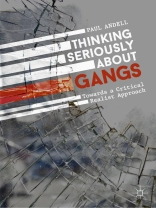This book examines the current debate about UK street gangs termed the ‘UK Gang Thesis’ debate. It argues that policy formations in the UK aimed at addressing street gangs preceding and succeeding the English riots of 2011 have encompassed positions of both gang denial and gang blame. The policy pendulum of denial and blame raises questions about where UK gang-policy stands, and which ideas and influences have framed our responses to this issue. The book will explore the UK Gangs Thesis using an analysis of empirical evidence from three sites in three English regions which encompasses periods of both gang denial and gang blame. This book is an examination of the relationship between theory, policy and practice in the context of the current UK gangs-discourse, and one of the first to examine the country lines phenomena.
There is a need to formulate a less partisan analysis of gangs in the UK, and to recapture the debate from analyses which understate or overstate the gang problem. In order to do so, Andell argues that a realist approach is needed which defines what constitutes social reality and overcomes theoretical and methodological difficulties in order to critique present formulations of gangs. This book provides this critique and makes suggestions for a more comprehensive and democratic approach to gang policy, in what can be termed a critical realist approach to gangs.
表中的内容
1. Realism, Street Culture and a Border Clash.- 2. Realist Methodology and Motivation.- 3. Policy Denial and New Gang Cities.- 4. Policy Blame: ‘Addressing Gangs in Austere Times’.- 5. Drivers and Contingencies of Gang Policy Formulation 1: Gangs Call-ins and Policy Transfer.- 6. Drivers and Contingencies of Gang Policy Formulation 2: ‘Bedazzled’-Think Tanks and the Media.- 7. Towards a Critical Realism of Gangs.- 8. Conclusion.
关于作者
Dr Paul Andell has more than twenty years of experience working in the criminal justice field. He has worked in the statutory, voluntary and private sectors undertaking criminal justice related work in practice, policy and research. Paul has worked as Head of the Criminal Defence Service for the Legal Services Commission, as a Performance Advisor for the Ministry of Justice, Community Safety Manager for the Greater London Authority and for 14 years was Vice Chair of the Lambeth Community Police Consultative Committee which was set up after Lord Scarman’s Report following the Brixton Riots. Paul was Director of the Brixton Gang X-IT project and was the Vice Chair of the London Gangs Forum. His current research interests are focused towards youth gangs and County lines.












